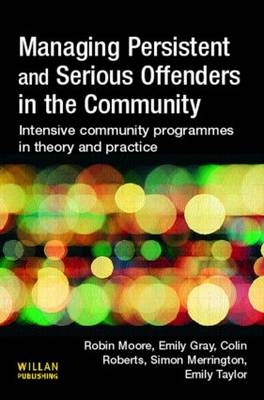
Managing Persistent and Serious Offenders in the Community
Seiten
2006
Willan Publishing (Verlag)
978-1-84392-181-3 (ISBN)
Willan Publishing (Verlag)
978-1-84392-181-3 (ISBN)
In recent years, the establishment of community programmes for offenders has become an important new component of penal policy. Expectations of these programmes have been high, but the evidence relating to their effectiveness is mixed, and a number of critical concerns have emerged. This book seeks to address these issues, whilst providing a timely review of the current literature.
Over the last few years intensive community programmes for both young and adult offenders have become established in the UK as an important new component of penal policy − the ISSP (Intensive Supervision and Surveillance Programme) for persistent and serious young offenders, and the ICCP (Intensive Control and Change Programme) for adult offenders. Expectations of these programmes have been high, but the evidence relating to their effectiveness is mixed, and a number of critical concerns have emerged.
This book seeks to address these issues, providing a timely review of the current literature, and presents findings of a recent national evaluation of ISSP. Emerging lessons for future penal policy are presented, and set within a wider theoretical context. The book concludes by stressing the need for greater realism and further evidential support if such programmes are to gain long-term credibility, and also to consider the appropriateness of differing forms of targeting as well as the emphasis placed on the various methods of surveillance.
Over the last few years intensive community programmes for both young and adult offenders have become established in the UK as an important new component of penal policy − the ISSP (Intensive Supervision and Surveillance Programme) for persistent and serious young offenders, and the ICCP (Intensive Control and Change Programme) for adult offenders. Expectations of these programmes have been high, but the evidence relating to their effectiveness is mixed, and a number of critical concerns have emerged.
This book seeks to address these issues, providing a timely review of the current literature, and presents findings of a recent national evaluation of ISSP. Emerging lessons for future penal policy are presented, and set within a wider theoretical context. The book concludes by stressing the need for greater realism and further evidential support if such programmes are to gain long-term credibility, and also to consider the appropriateness of differing forms of targeting as well as the emphasis placed on the various methods of surveillance.
Moore, Robin; Gray, Emily; Roberts, Colin; Taylor, Emily; Merrington, Simon
Introduction Part 1: The Development of Intensive Community Programmes 1. Political and theoretical foundations 2. Empirical findings Part 2: Case Study − the Intensive Supervision and Surveillance Programme 3. The introduction of ISSP 4. Referrals onto ISSP 5. Delivery of ISSP 6. The impact of ISSP Part 3: Looking Forward 7. Emerging lessons 8. Critical concerns
| Erscheint lt. Verlag | 1.7.2006 |
|---|---|
| Verlagsort | Cullompton |
| Sprache | englisch |
| Maße | 156 x 234 mm |
| Gewicht | 498 g |
| Themenwelt | Recht / Steuern ► EU / Internationales Recht |
| Recht / Steuern ► Strafrecht ► Kriminologie | |
| Recht / Steuern ► Strafrecht ► Strafverfahrensrecht | |
| ISBN-10 | 1-84392-181-2 / 1843921812 |
| ISBN-13 | 978-1-84392-181-3 / 9781843921813 |
| Zustand | Neuware |
| Haben Sie eine Frage zum Produkt? |
Mehr entdecken
aus dem Bereich
aus dem Bereich
klare Antworten aus erster Hand
Buch | Softcover (2023)
UTB (Verlag)
19,90 €


